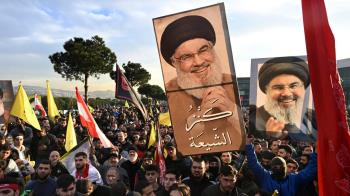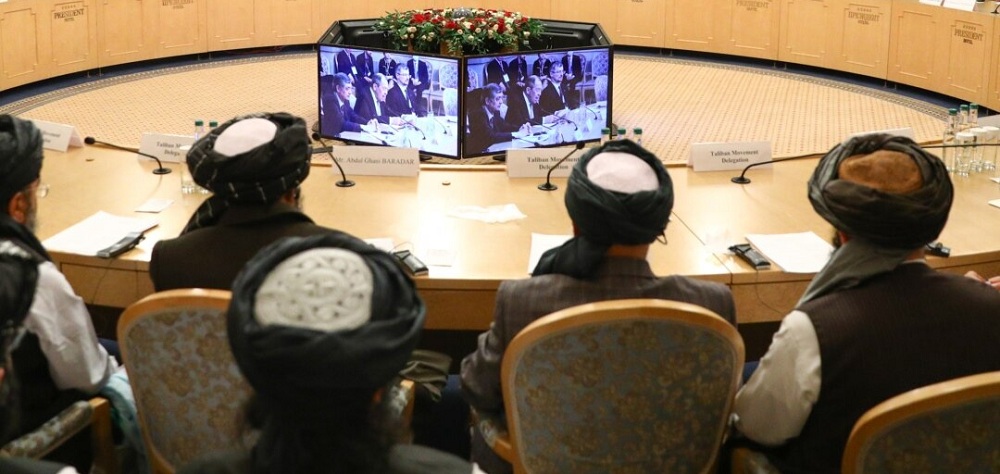Alwaght- Moscow Format conference was held on Friday in Russia’s Kazan city, having top on its agenda essential Afghanistan challenges.
The remarks by Russia’s special envoy to Afghanistan Zamir Kabulov and also Russian Foreign Ministry spokeswoman Maria Zakharova before the meeting outlined the important points of discussion including the comprehensive government formation and fight against terrorism and drugs trafficking.
Another point of discussion was the human rights in Afghanistan and education of women in the Central Asian country. The envoys of participating countries reiterated their countries’ ideals on these issues.
An important point in this meeting of Moscow Format was the invitation of the Islamic Emirate of the Taliban to attend the meeting, and the Taliban, by sending a delegation headed by Acting Foreign Minister Amir Khan Motaghi, they used this opportunity to consult with the officials of the present countries and express their views.
While so far only a few countries have recognized the government of the Taliban, pursuing this issue is one of the main goals of the Taliban behind attending Kazan meeting.
In addition to Russia, the Moscow Format for Afghanistan includes China, India, Iran, Kazakhstan, Pakistan, Kyrgyzstan, Tajikistan, Turkmenistan, and Uzbekistan.
Iran was represented by its ambassador to Kabul and the special representative of Iranian president to Afghanistan Hassan Kazemi Qomi.
Friday’s meeting was the fifth meeting of the Moscow Format on Afghanistan. The Moscow dialogue mechanism on Afghanistan was launched in 2017 with the main goal of facilitating an inter-Afghan political settlement to stabilize the situation in this country.
Its first meeting was held on April 14, 2017, with the presence of deputy foreign ministers and special representatives of 11 countries, including Afghanistan.
The main goal of the format is to promote the process of national reconciliation in Afghanistan and the rapid establishment of peace. Since the Taliban took control of Kabul in August 2021, the Moscow Format consultations were held twice in October of the same year and in November 2022. Although Taliban Deputy Prime Minister Abdul Salam Hanafi was present in the talks in 2021, the last round of the meeting was held in Moscow in November 2022 without the participation of the Taliban.
Inclusive government still a top international demand
Since the assumption of power by the Taliban, the main condition of the international community for recognition of the Taliban rule has been formation of a inclusive government covering ethnic and religious factions.
Currently, Iran, Pakistan, Saudi Arabia, and the UAE are the only countries that recognize the Taliban government. However, Russia and India are among the countries that have diplomatic missions in Afghanistan.
The main emphasis of Moscow meeting was the formation of the inclusive government in the country. The Taliban are almost exclusively Pashtuns, who are only one of the many ethnic groups in Afghanistan, but make up about 55 percent of Afghanistan’s total population. The Taliban argues that the current government covers all ethnic groups and religions of Afghanistan and that it has fulfilled its obligation to form an inclusive government, but contrary to this claim, this demand has not been met yet.
On the sidelines of the meeting, Kabulov told the journalists that Moscow expected Kabul to take further constructive steps towards an inclusive government.
“In the future, this may be a basis for recognition of the new leadership in Afghanistan,” he was quoted as saying.
Another issue that makes the Moscow Format meeting important is the visit of Ahmad Massoud, the leader of the National Resistance Front of Afghanistan, to Russia and the warm reception he received from the Russians. It seems that in the meeting between Massoud and the Russian officials, the talks about the political situation in Afghanistan were important. A number of other Afghanistan political figures were expected to join the meeting to facilitate inter-Afghan dialogue.
Another vital issue is the concern of Central Asian countries and Russia concerning the activities of terrorist groups in Afghanistan and the increase in drug trafficking. Russian Foreign Minister Sergei Lavrov maintained that Moscow is still concerned about ISIS activities in Afghanistan.
But the Taliban say that these concerns are baseless.
According to the Taliban sources that quoted Acting Foreign Minister Amir Khan Motaqi, over the past two years, the government after rebuilding the political, security and economic systems, accelerated its fight against trained fighters affiliated with rebel groups.
From the type of the stances of the Taliban, it can be concluded that there is a long way and more meetings are needed to see expectations of regional countries, including an inclusive government, met.
But on the other hand, given the acute economic challenges in Afghanistan and the necessity of international handling of humanitarian issues in this country, Kazan meeting, in addition to examining the latest regional coordination to help the people of Afghanistan, highlights the destructive role of the West through sanctions on Kabul as a factor fomenting crisis in the country.
In this relation, Russian Foreign Minister Sergey Lavrov told the participants that the Western countries have inflicted an irreparable damage on Afghanistan people, and they should shoulder the post-war reconstruction of the war-ravaged country. Instead, he said, the US blocks Afghanistan assets, leaving people living in difficult conditions.
New chapter of regional cooperation
Kazan meeting was more important than its predecessors because earlier this month China was the first international power to name a new ambassador to Afghanistan.
Though the countries involved in the Moscow Format still refuse to fully recognize the Taliban rule, they seek to engage with the new rulers in Kabul on security, humanitarian and, recently, economic issues.
China seeks stable situation in Afghanistan as it wants to advance the Road and Belt Initiative (RBI) from Pakistan to Afghanistan and secure a safe access to the Central Asia. Earlier this year, Afghanistan joined the RBI, as Pakistan has designed a development roadmap for Kabul and, besides Uzbekistan, wants Trans-Afghan railway project to be concluded. India, on the other hand, wants advancement of TAPI (Turkmenistan-Afghanistan-Pakistan-India) gas pipeline. Suhail Shahin, the head of Taliban Political Office in Doha, earlier said: “We want positive traditional ties with India, as we had for several decades. But we expect New Delhi to support our agenda for economic stability and recognition.”



























